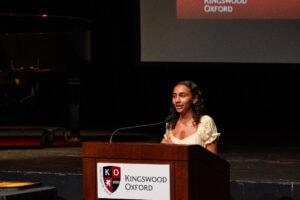November 13, 2023
A Small but Important Step in Teaching Students To Speak Clearly and Concisely
By Andy Krugman
Middle School History Department Chair
Sometimes, a single word spoken – or not spoken – in the classroom can make a big difference.
Speaking Freely
Among the many skills we teach at KO, communicating ideas through speech is high on the list. Our students give oral presentations, debate issues in class, conduct campus tours for visitors, and make speeches and announcements in assemblies. This helps prepare them for college and careers where they often have to express themselves with clarity and precision.
With this goal in mind, my classes tend to be discussion-oriented as we explore current issues and past events and discover the many ways the two are connected. When the kids make these connections, it is fantastic to see.
At the beginning of each school year, I make it clear to my students that there is a big difference between how one speaks in the classroom and in other formal situations and how one speaks when hanging out with friends.
Telling It ‘Like’ It Is
About ten years ago, one of my eighth-grade history students was commenting on a class discussion. As she was speaking, the student used the word “like” at least four times in a single sentence, not as a comparative or as a verb, but as a distracting and needless filler word. I must admit, at the time this occurred, the habit many students have of infusing “like” into virtually every sentence, often more than once, had been driving me a bit crazy for quite a while.
Without even thinking, I asked the student (politely, of course) to start the sentence over again, but this time without saying “like.” When the student said “like” again, I asked her to begin again. This cycle repeated itself at least five times. She was a good sport, and I told the class that I was in no way trying to embarrass her and that I appreciated her willingness to keep trying.
I then told the class there was a new rule. If anyone, including me, said “like” for no apparent reason, that person would have to start the sentence over again and not stop until making the point without using that word.
Great Minds Shrink a ‘Like’
Since that day, this has been a rule in every class I teach. Once the kids hear others, as well as themselves, needlessly and repeatedly using “like,” they make a concerted effort to self-regulate. It takes both awareness and practice to break this habit. The teenage brain may struggle a bit more with this because it’s hard to think about not using a word while trying to formulate and articulate thoughts at the same time. That being said, eschewing “like” takes PRACTICE, and it can be done.
Of course, I don’t expect students to correct their friends at lunch for saying “like” because, if they do that, they’ll probably end up not having any friends! However, hearing how others sound and then realizing how annoying they sound can make a difference, and a positive one at that.
Two weeks ago, during alumni weekend, I spoke with an alum and former student who told me about a recent conversation with his sister, whom I had also taught. He said that when his sister caught herself saying “like” while speaking to him, she stopped short and blurted, “Mr. Krugman would not be happy!” The truth is that I was incredibly happy that my emphasis on this rule has stayed with her many years later.
My ban on “like” might seem superficial, quirky, or trivial. Still, I think it teaches students an important wider lesson about choosing their words thoughtfully and carefully, respecting the sensibilities of their audience, and expressing themselves clearly, concisely, and smoothly.
Thinkers
Blog Main News
